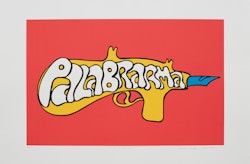Cecilia Vicuña in
A Convening of Civic Poets
6 October—4 February 2024
Group Exhibition at KADIST, Paris, France
A Convening of Civic Poets is a collaboration between KADIST Paris and Sharjah Art Foundation. Co-curated by both organizations’ directors, it showcases works from the respective collections alongside invited contributions that seek to probe the relevance of the figure of the civic poet and their redefinition on civic engagement.
Pier Paolo Pasolini, a prominent reference, would define the role of the poet as a public voice endowed with an ethical responsibility towards reality and against the brokenness of the world. Civic poets champion an intellectual rage that addresses present and historical urgencies, and expand through their writings and actions the practice of social justice as well as a renewed sense of linguistic agency.

The exhibition features artists who pay tribute to civic poets. Manthia Diawara‘s film discusses freedom with activist Angela Davis and Bouchra Khalili‘s film and installation explore Jean Genet’s radical allyship, while Hajra Waheedfocuses on songs from activists and artists to amplify transnational solidarity. Helina Metaferia celebrates the stories of black female civil rights protesters, and Jinoos Taghizadeh imprints on the reverse of stamps the portraits of Iranian intellectuals murdered because of their dissidence.
Radios and their transformative role are also part of the exhibition, including a mixtape by Radio Alhara & Learning Palestine Group on the present, past and future of Palestine, and Hajer Ben Boubaker‘s podcast on North African migrant movements in Paris. Some artists in the show identify as poets, harnessing language’s political power, like Cecilia Vicuña‘s Palabrarma series and David Wojnarowicz‘s spoken word addresses during the AIDS crisis filmed together with Marion Scemama. Public events and discussions with Farah Al Qasimi and Joe Namy complete the project, expanding on related questions.
A Convening of Civic Poets connects these diverse voices and issues, forming a geography of kindred struggles and solidarities spanning from Palestine to Barbès. However, a central tension — as present in Nidhal Chamekh’s work — arises as artists grapple with the role of being witnesses and how to transmit their experiences without reducing them. This project doesn’t aim to provide definitive answers but rather seeks to explore the relevance of civic poetry today in fostering a sphere of radical civility and new forms of artistic engagement.